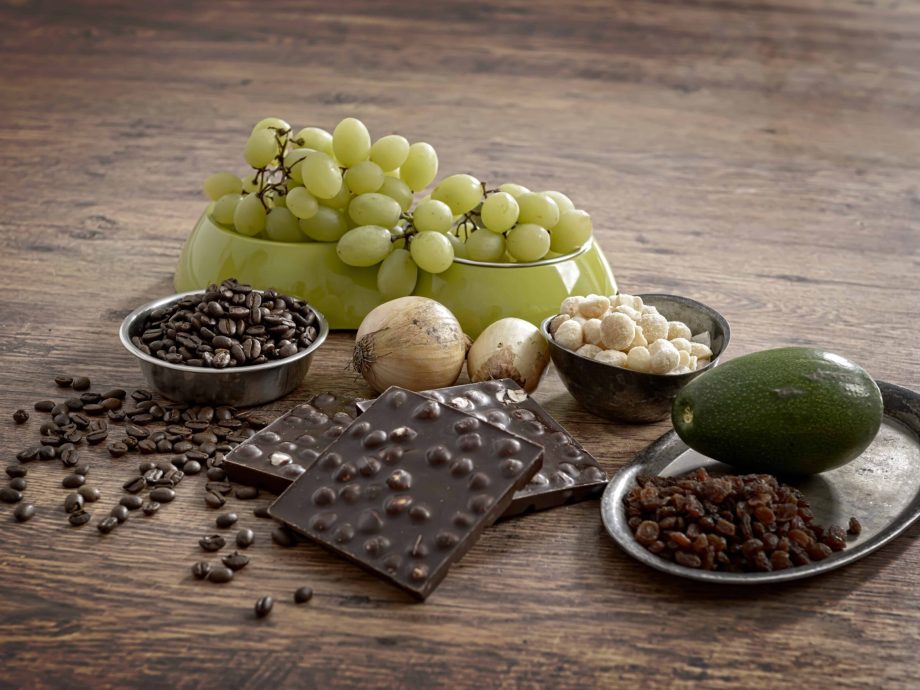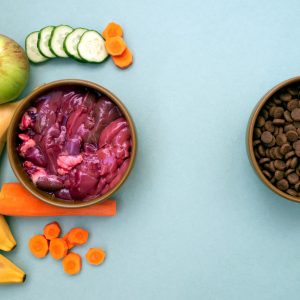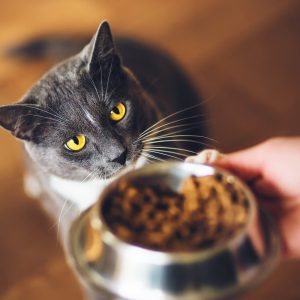Certain foods can be toxic for dogs and cats and should therefore be avoided. However, if your pet accidentally ingests any of the foods of the list below (or any other food that you are unsure of its safety), it is important to inform your veterinary surgeon immediately, since vomiting may be induced before the toxic product is absorbed.
Induction of Vomitting
However, induction of vomit will only be effective when performed soon after the ingestion (usually within two hours) and therefore, it is important to act quickly. Even if the ingestion is not recent, your veterinary surgeon may advise to hospitalise your pet for monitoring, provide treatment to limit the absorption of the product or give supportive treatment. Blood tests may be necessary to ensure that there is no organ failure associated with the intoxication. Even ingesting small amounts of certain products can be fatal and, if in doubt, it is important to discuss this with your veterinary surgeon.
Potential food hazards
- Onion, garlic, leeks or chives: can cause severe anaemia, which is a decrease in number of red blood cells, due to their destruction. These foods are toxic cooked or raw. Toxicity can be due to ingestion of a large amount of these products once or of a low amount ingested repeatedly.
- Chocolate: The toxicity is due to a component called ‘theobromine’ that is a cardiac stimulant. Chocolate can also contain caffeine. The severity of the intoxication depends on the amount of chocolate ingested in relation to the size of the pet and the amount of cocoa. Usually, the higher the cocoa content of the chocolate, the more dangerous it is. The clinical signs usually appear hours after the ingestion and include gastrointestinal signs (vomiting, diarrhoea, abdominal pain), neurological signs (excitability, restlessness, wobbliness, fast breathing, muscle trembling, seizures) and abnormal heart rhythms.
- Xylitol: This is an artificial sweetener, usually contained in sugar-free chewing gums, sweets, and toothpaste. It can also be contained in certain type of human medications. It can cause gastrointestinal signs as well as a sudden drop in the blood sugar levels, which can cause weakness, wobbliness, seizures, and death. This usually occurs within hours of ingestion. It can also cause liver failure which usually occurs within days after ingestion.
- Grapes, raisins and sultanas (or cakes or other products containing them, like Christmas fruit cakes). They can cause renal failure in dogs. After ingestion, dogs usually develop vomiting, lethargy, and increased thirst within hours, followed by lack of appetite, reduced urination, tremors, and diarrhoea. Kidney failure usually occurs within 1 to 3 days after ingestion.
- Avocado: Any part of the plant can be toxic. It contains a toxin that can cause mild signs such as vomiting and diarrhoea. Furthermore, the avocado stone can be dangerous as, if ingested, can cause a gastrointestinal blockage.
- Nuts (especially macadamia nuts): can cause weakness, depression, shaking and vomiting. Usually, signs occur within hours of ingestion.
- Coffee and tea: The toxicity is due to the caffeine (which is similar to the theobromine). Clinical signs are usually cardiac and neurological, including fast breathing, restlessness, and seizures, as well as vomiting and diarrhoea.
- Bones, rawhide bones and corn on the cob: bones can cause choking and gastrointestinal blockage (at any level, such us the food pipe, stomach or intestines) and even perforation, which can be fatal. Rawhide bones are not easily digested, which can cause large chunks being released and cause a risk of obstruction. Corn on the cob is a common cause of gastrointestinal obstruction as the cob cannot be digested.
- Alcoholic beverages: can cause gastrointestinal signs such us vomiting or diarrhoea, as well as incoordination, depression of the nervous system, coma and, in extreme cases, death.










